"Will AI take my job?"
This is the question that haunts software engineers as AI continues to evolve at breakneck speed. It's a fear that's understandable, even rational. After all, if AI can write code, debug errors, and even design systems, what's left for us?
But in my experience both as a developer and a CEO deeply immersed in building AI tools for developers, I'm here to tell you that not only is your job safe, it's about to become more exciting, impactful, and valuable than ever before.
This pattern of technology augmenting rather than replacing skilled workers has played out many times throughout history. Let's dive into some specific examples:
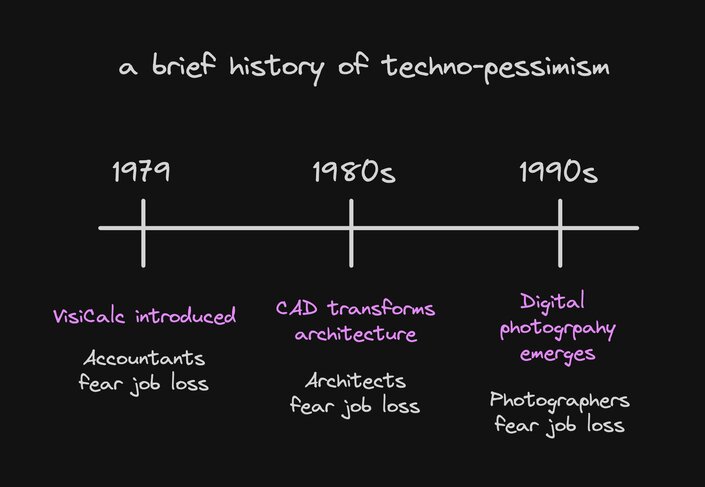
When VisiCalc, the first spreadsheet program, was introduced in 1979, many accountants feared for their jobs. Instead, spreadsheets revolutionized the field:
- Routine calculations were automated, freeing accountants to focus on analysis and strategy
- The accessibility of financial modeling led to the rise of more sophisticated business planning
- Accountants who embraced the technology became more valuable, offering deeper insights to their clients
Today, accounting is a thriving field, with professionals leveraging advanced software to provide high-level financial guidance.
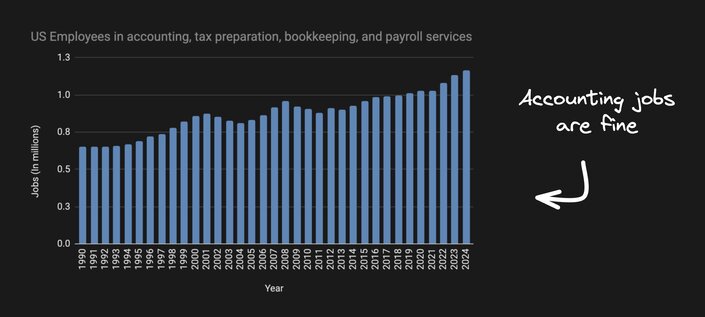
The introduction of CAD software in the 1980s transformed architecture:
- Drafting tables were replaced by computer screens
- Complex calculations for structural integrity became automated
- 3D modeling allowed for more ambitious and intricate designs
Far from eliminating architects, in practice CAD allowed them to:
- Iterate designs more quickly
- Visualize projects in new ways
- Take on more complex and ambitious projects
- Focus more on creative design and less on technical drawing
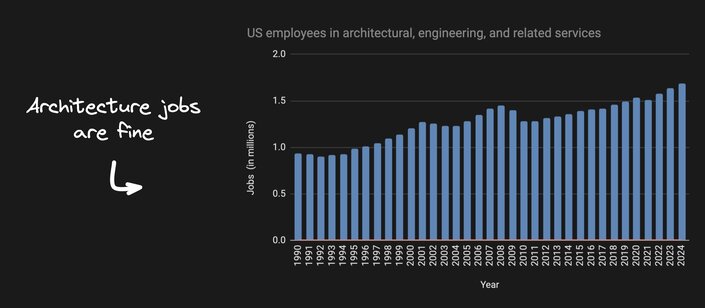
The shift from film to digital could have spelled doom for professional photographers. Instead, it transformed the industry:
- Post-processing became more accessible, allowing for greater creativity
- The ability to take more photos led to capturing better moments
- Sharing and publishing became easier, creating new opportunities
While some traditional roles (like film developers) disappeared, new ones emerged (digital retouchers, social media photographers). The core skills of composition, lighting, and capturing moments remain uniquely human.
While technological progress has displaced workers in some industries, software engineering remains resilient. Let's examine a few cases of job displacement and contrast them with software engineering:
Robotics and advanced machinery have significantly reduced the need for human workers in manufacturing sectors:
- Assembly line workers replaced by robots in automotive manufacturing
- Textile production largely automated, displacing many workers
Online booking platforms have largely eliminated the need for traditional travel agents:
- Consumers can easily compare prices and book flights and hotels online
- Destination information readily available on the internet
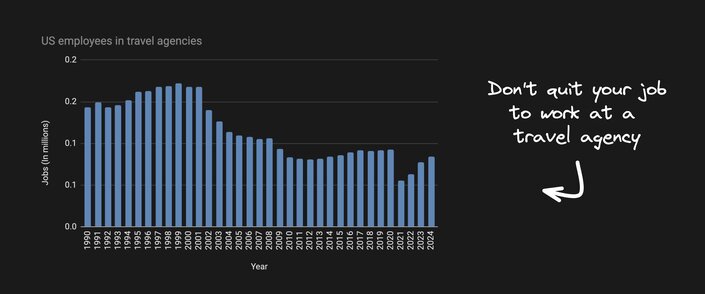
Automated switching systems have made telephone operators obsolete:
- Direct dialing eliminated human intervention in connecting calls
- Automated directories replaced human-assisted lookups
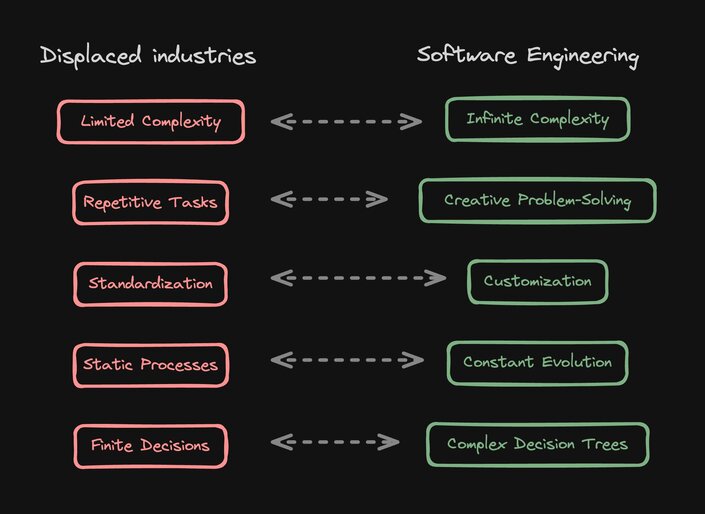
- Infinite complexity: Unlike physical goods or standardized services, software can grow arbitrarily complex, constantly presenting new challenges.
- Creativity and problem-solving: Software development requires continuous creative input and complex problem-solving, unlike repetitive or procedural tasks in the displaced industries.
- Constant evolution: The software field rapidly changes with new technologies, platforms, and user needs, demanding constant adaptation and learning.
- Customization: Software often requires unique solutions for each client or user, contrasting with trends towards standardization in other industries.
- Decision complexity: Software architecture involves an almost infinite decision tree, far beyond the finite set of choices in displaced roles.
These factors make software engineering more resilient to automation and AI, positioning it as a field that's augmented rather than replaced by technological advancements.
Far from making developers redundant, AI tools like GitHub Copilot and ChatGPT are acting as force multipliers — dramatically increasing what individual engineers can accomplish. By handling routine coding tasks, catching errors, and offering suggestions, AI frees up developers to tackle more complex challenges and focus on architectural decisions.
It's not about replacing human ingenuity, but augmenting it. Imagine having your own team of tireless robot assistants, implementing your ideas and handling the grunt work while you orchestrate the overall vision. That's the promise AI holds for software engineering.
For example, AI can:
- Automate redundant tasks, like converting Figma designs to code
- Quickly prototype ideas, allowing faster iteration
- Assist with documentation, making knowledge sharing easier
- Enable better collaboration with non-dev team members by empowering them to handle tasks that developers often find tedious or time-consuming
Each of these capabilities doesn't replace the need for a skilled developer — it amplifies what that developer can achieve in a given timeframe.
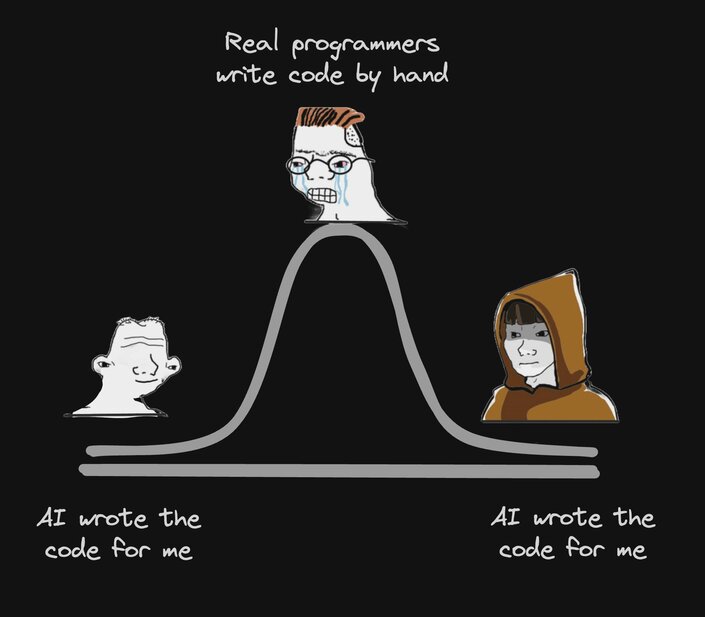
As AI takes over more of the line-by-line coding, developers will naturally shift towards higher-level thinking and problem-solving. This isn't a downgrade — it's an evolution of the role into something even more impactful and intellectually engaging.
Software engineering is an infinitely deep field. As we solve one layer of problems, we uncover new challenges at a higher level of abstraction. AI will simply accelerate our progress up this ladder, allowing developers to work on increasingly sophisticated and meaningful projects.
Each step up this ladder doesn't eliminate the need for developers — it allows them to build more complex, powerful, and user-friendly applications.
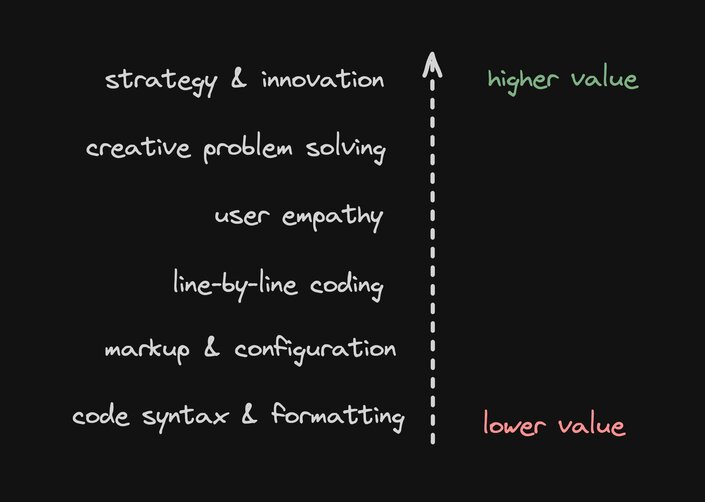
You don’t hand write assembly, right? Do you imagine us being able to write high- level code in JS has made companies want to do more with code or less?
You don’t hand format all your code, right? You use formatting tools like prettier or do you hand craft every line?
AI is set to continue this trend, pushing developers to focus on even higher-level concerns like system architecture, user experience design, and solving complex business problems.
Rather than fearing AI, I encourage developers to embrace it as a powerful tool in their arsenal. Here are a few suggestions:
- Experiment with AI coding assistants like GitHub Copilot. Get a feel for their strengths and limitations in real- time
- Use ChatGPT or Claude to explore ideas, debug issues, or learn new concepts. Think of them as always-available mentor figures.
- Focus on developing your high-level problem-solving and architectural design skills. These are areas where human creativity still reigns supreme.
- Build side projects with LLMs to further explore their potential to automate tedious parts of your job and let you focus on what you love most.
At the end of the day, you will be a better developer if you have fun with it. We all know that most developers love to spend a week automating a task that would’ve taken an hour to do manually.
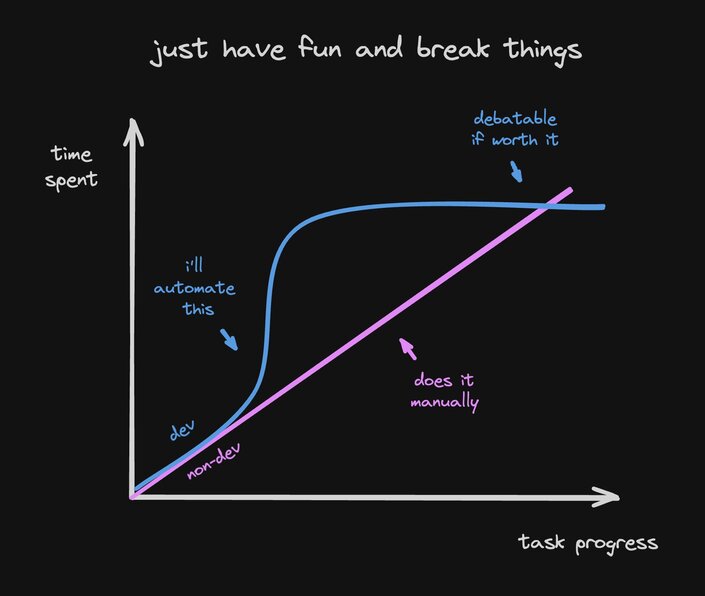
With LLMs, we now have a new primitive to work with to supercharge our ability to automate a broader variety of tasks.
So, use it! Find things you don’t like and experiment with using LLM APIs to automate your tasks. In my experience, its a lot of fun. And if you want to get more advanced, you can even tinker with training your own models yourself.
As a CEO of a tech company, I'm not looking at AI as a way to reduce our development team. Quite the opposite — I see it as a way to dramatically increase the value each developer brings to the organization. With AI handling routine tasks, our human engineers can focus on innovation, complex problem-solving, and pushing the boundaries of what's possible.
This increased productivity and focus on high-value work makes each developer more valuable than ever. Far from wanting fewer developers, I anticipate wanting more as AI amplifies what each individual can accomplish, especially to always stay ahead of our competition.
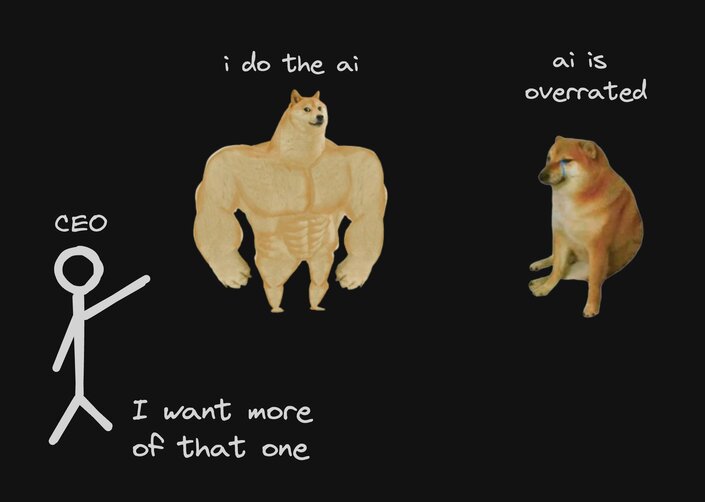
Consider:
- Faster prototyping leading to more innovative products
- Developers freed to spend more time understanding and solving core business problems
- Increased capacity to take on more complex and ambitious projects
- A larger team of AI-supercharged developers is a competitive advantage to beat rival companies
In this landscape, the limiting factor isn't the cost of developers, but the ability to fully leverage their enhanced capabilities.
No.
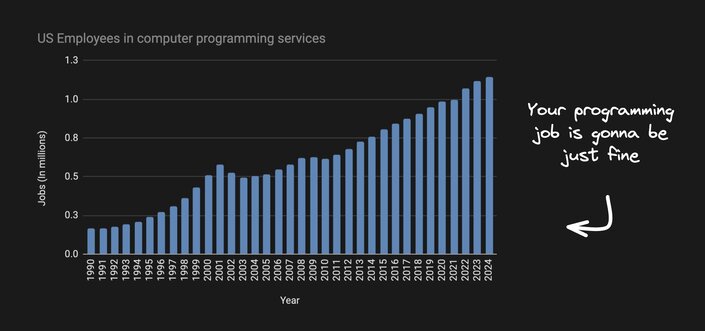
Source: US Bureau of Labor Statistics
The rise of AI in software development isn't something to fear — it's something to embrace enthusiastically. By automating routine tasks and augmenting human capabilities, AI tools are ushering in a new golden age of software engineering.
Developers who adapt and leverage these tools will find themselves more productive, more creative, and more valuable than ever before. The future of software engineering isn't about competing with AI — it's about orchestrating it to build amazing things.
So don't just watch the AI revolution — lead it. Embrace these new tools, focus on developing your uniquely human skills of creativity and complex problem-solving, and prepare to build the next generation of world-changing software.
After all, why code if not to push the boundaries of what's possible? AI is simply the latest and most powerful tool in our arsenal to do just that. The developers who thrive will be those who see AI not as a threat, but as a powerful ally in creating the future.
Builder.io visually edits code, uses your design system, and sends pull requests.
Builder.io visually edits code, uses your design system, and sends pull requests.



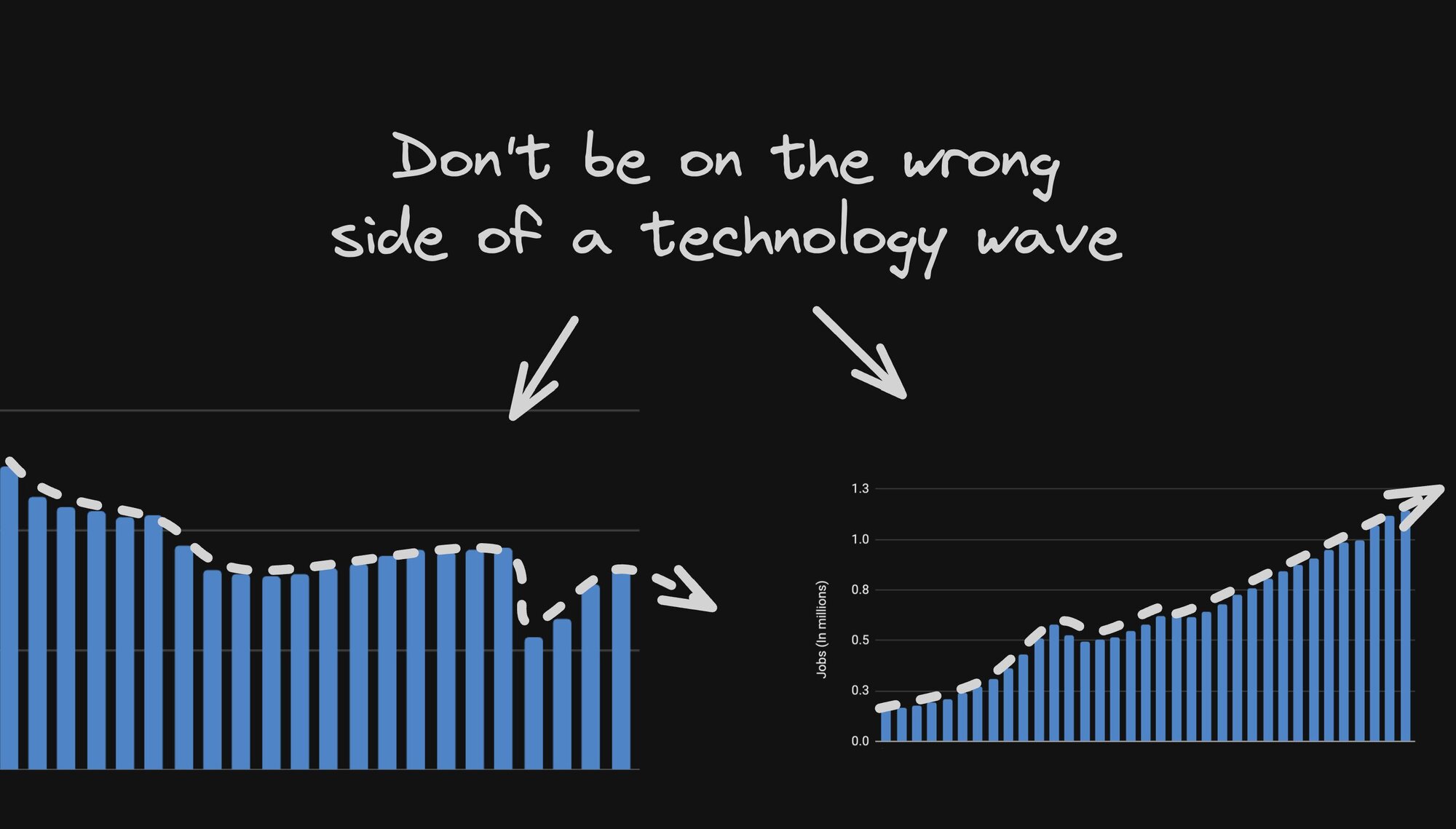
 Connect a repo
Connect a repo








